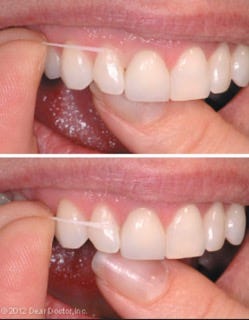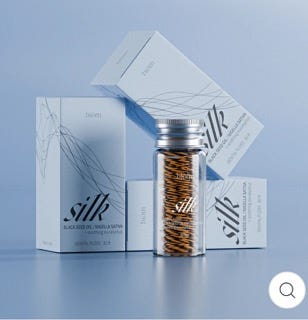Why I Stopped Flossing
Unpacking Truth
As many of you are likely aware, we are all moving and breathing in one big bowl of plastic soup. An increasing amount of research is pointing to the dangers of our bodies being burdened by the plastics known Per- and polyfluoroalkyl substances(PFAS) that surround us. These materials are commonly called forever chemicals because they do not break down in the environment. From cookware, food packaging, water bottles and dental floss, it is hard to escape these products unless exercising a strong conscious effort to minimize exposure. It is impossible to get away from plastics completely but for those of you on a mission to reduce your toxic burden, I would like to share about a new product I have found and started using daily.
I have to admit that I was a bit startled to learn that the most popular and easiest to use dental floss is made with forever chemicals. Prior to taking this deep dive into health, it never occurred to me to consider the composition of what we are placing into our gums. Now that I am here, I want to provide you with options that are natural and can help improve your dental health.
Let's take a brief look at the history of humans recognizing the need to clean between their teeth and the materials they utilized. Before the era of industrialization, horse hair and twigs were the original forms of interdental cleaning. In the 1800s dentists started using a thin silk thread that was sometimes coated in wax to clean between teeth. Johnson and Johnson patented a silk dental floss in 1898 using the same material doctors use for closing wounds. It wasn't until around 1940 when the cost of silk was increasing during WWII that nylon floss entered the dental marketplace. This was likely a welcome change from the shredding nature of early filaments.
It is estimated that only about 12% of American floss daily. Most of us in the dental field struggle to get patients to brush their teeth for a full two minutes, let alone floss effectively. Compounding this challenge are news articles like this one from the NYT. The news headline suggested that the reader should not feel guilty about not flossing because research demonstrated that flossing had little to no benefit. This gave much desired ammunition to those who refuse the practice. Basically the science did not find a significant reduction in plaque after one and three months of daily flossing. I believe there are two simple reasons for this outcome: patients don't know how to floss properly AND we are using products that lack effectiveness.
To mitigate the first hurdle, we as a profession need to do a better job of educating our patients during their appointments. I think we often make the flawed assumption that patients know how to floss. Personal note: I am the daughter of a dentist and it was not until I got to dental school that I learned the proper technique. My father probably figured his hygienists reviewed this with me and vice versa. If no one has ever taken the time to have you hold a mirror and watch the effective way to floss, please ask the next time you have your teeth cleaned. Here is a quick video for those of you eager to learn!
Overcoming the second challenge is going to take a shift away from the plastic based flosses we've been using for the past 80 years and returning to the natural fibers of our predecessors. No, not horse hair! I have often compared flossing with smooth Teflon flosses like trying to dust your home using tissue paper. Sure, you can move the dust particles around but you're still left with a dusty home. Using a floss with natural texture like silk can help you to not only move but also remove the plaque leading to a more effective experience.
My new favorite floss is from Better Biom and is a 100% silk based product. The features that I love include:
it is packaged in a glass refillable vial that cuts down on environmental waste
it is an expanding floss which means it more effectively cleans the wider spaces where food gets caught
it is infused with Nigella Sativa which has anti-inflammatory benefits for improved gingival health
Eucalyptus is used for its antimicrobial properties and clean taste
it is never tested on animals and is biodegradable
There is a small learning curve with natural fiber flosses but the results are worth the time invested to learn. Your mouth will feel cleaner and your gums will thank you! The market for natural flosses is growing and you have many options to chose from. After having tried a dozen or more, this one came out above the rest for ease of use, lack of breaking and clean outcomes. Happy flossing!





During my last dental checkup, the hygienist went to floss my teeth and I asked her what floss she was using. "Glide" I told her to just skip the flossing! Next time I will bring my own floss. To the best of my knowledge, regular Oral B (NOT GLIDE) is just waxed nylon. It's one of the few that can get between my tightly packed teeth and hold up under flossing. Please let me know if you think there is an issue with this one. I will look for other ones, but not sure they will hold up to flossing my teeth! Thanks for posting this - I knew about it but hadn't heard about the silk-based alternatives.
I'm relieved I don't have to resort to horse hair for flossing ;-).